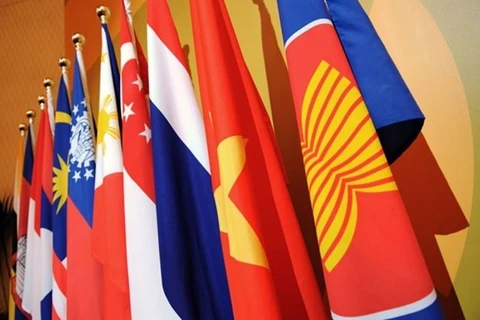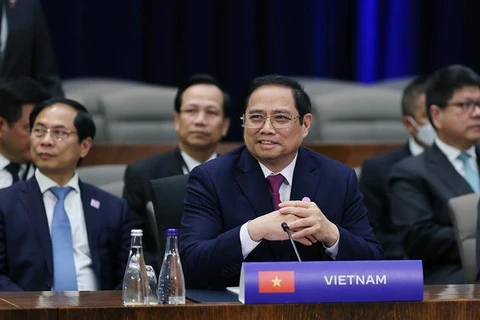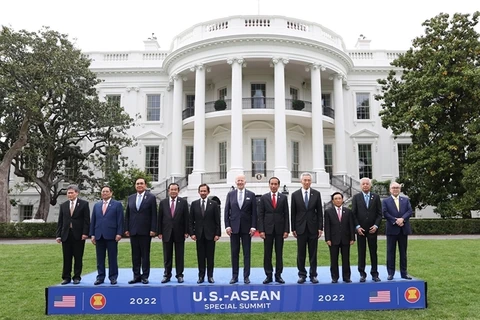Hanoi (VNA) - Ten ASEAN countries and three partners of Japan, China and the Republic of Korea have agreed to strengthen financial cooperation in the region to cope with negative impacts from the Russia-Ukraine conflict and COVID-19 pandemic.
At the 25th ASEAN+3 Finance Ministers’ and Central Bank Governors’ Meeting (AFMGM+ 3), which was convened on Ma y 12via videoconference, participants agreed that ASEAN+3 financial cooperation has a more essential role to play in supporting regional economies to navigate these obstacles.
A joint statement released after the event stated that “the ASEAN+ 3 economies have remained steadfast in weathering the challenges posed by the COVID-19 pandemic." It noted that since early 2021, the countries have focused on ramping up the vaccination rates to protect their populations and have adopted more targeted containment measures to minimize the impact on their economies and to support recovery.
As a result, the region saw robust growth of around 6 percent in 2021. Looking ahead, given the strong protection afforded by high vaccination rates in the region, the region can look forward to further opening-up and stronger economic recovery this year.
The statement noted however, that the sharper-than-expected monetary policy normalisation in some major advanced economies, continuing supply chain disruptions, and rising food and energy prices aggravated by the current Russia-Ukraine conflict may pose downside risks to the outlook for the region’s trade and investment, growth, and inflation.
Therefore, ASEAN+3 financial leaders affirmed that “continuing supportive policies are crucial in alleviating the impact of the pandemic and strengthening a sustained economic recovery.” At the same time, they acknowledged the importance of avoiding misallocation of resources and ensuring support for new and growing sectors, pledging that they will calibrate policy measures introduced in response to the pandemic as the economic recovery gains traction, preserve monetary and financial stability and long-term fiscal sustainability, and safeguard against downside risks and negative spillovers.
In order to foster regional financial collaboration, they highlighted the importance of further strengthening the Chiang Mai Initiative Multilateralisation (CMIM), the ASEAN+3 Macroeconomic Research Office (AMRO), the Asian Bond Markets Initiative (ABMI), and ASEAN+3 Future Initiatives (AFI)./.
At the 25th ASEAN+3 Finance Ministers’ and Central Bank Governors’ Meeting (AFMGM+ 3), which was convened on Ma y 12via videoconference, participants agreed that ASEAN+3 financial cooperation has a more essential role to play in supporting regional economies to navigate these obstacles.
A joint statement released after the event stated that “the ASEAN+ 3 economies have remained steadfast in weathering the challenges posed by the COVID-19 pandemic." It noted that since early 2021, the countries have focused on ramping up the vaccination rates to protect their populations and have adopted more targeted containment measures to minimize the impact on their economies and to support recovery.
As a result, the region saw robust growth of around 6 percent in 2021. Looking ahead, given the strong protection afforded by high vaccination rates in the region, the region can look forward to further opening-up and stronger economic recovery this year.
The statement noted however, that the sharper-than-expected monetary policy normalisation in some major advanced economies, continuing supply chain disruptions, and rising food and energy prices aggravated by the current Russia-Ukraine conflict may pose downside risks to the outlook for the region’s trade and investment, growth, and inflation.
Therefore, ASEAN+3 financial leaders affirmed that “continuing supportive policies are crucial in alleviating the impact of the pandemic and strengthening a sustained economic recovery.” At the same time, they acknowledged the importance of avoiding misallocation of resources and ensuring support for new and growing sectors, pledging that they will calibrate policy measures introduced in response to the pandemic as the economic recovery gains traction, preserve monetary and financial stability and long-term fiscal sustainability, and safeguard against downside risks and negative spillovers.
In order to foster regional financial collaboration, they highlighted the importance of further strengthening the Chiang Mai Initiative Multilateralisation (CMIM), the ASEAN+3 Macroeconomic Research Office (AMRO), the Asian Bond Markets Initiative (ABMI), and ASEAN+3 Future Initiatives (AFI)./.
VNA






















